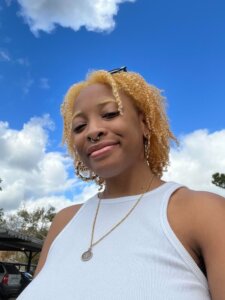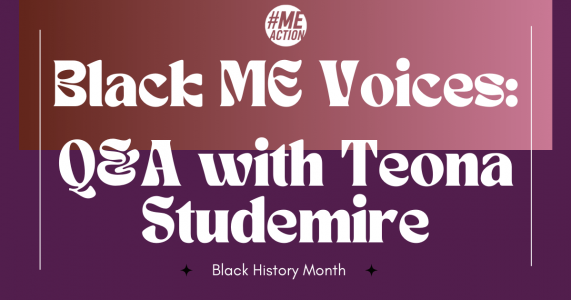With it being Black History Month, it was crucial to me to make sure we spotlighted someone from the ME/CFS and Long COVID community who is Black. Being Black and disabled is an entirely different experience. Not only do we deal with ableism, but we also deal with racism, especially medical racism. According to the Journal of Women’s Health, “Black women continue to experience excess mortality relative to other U.S. women, including—despite overall improvements among Black women—shorter life expectancies and higher rates of maternal mortality.”
The first person I thought of was Teona Studemire. Teona is a digital creator and freelance writer. They have been using their platforms to discuss their experience with having ME/CFS. Teona credits #MEAction with helping them with their diagnosis, and it warms my heart to know people from all walks of life have benefited from the advocacy #MEAction.
Teona was kind enough to use their spoons to do this Q&A, and we’re so grateful for that.

- When did you first show signs of ME/CFS?
“I first showed signs of M.E. towards the end of 2018 and the beginning of 2019 after catching the Flu.” - When were you diagnosed, and how long did it take for a diagnosis?
“I first got an official diagnosis, I think, in 2021, but it didn’t get solidified until about a year later. My PCP suspected that I had M.E., but since I was struggling to get to appointments and there were no specialists locally, it took longer to diagnose.” - What barriers did you encounter as a Black person with ME/CFS?
“Initially, many doctors didn’t believe my symptoms and looked at me like I was lying or drug seeking, and since M.E. still isn’t widely recognized, many doctors thought I was making up my condition.” - What were the attitudes of your doctors? Did they believe you?
“My PCP believed me from our first appointment. My Rheum didn’t believe me at all and had terrible bedside manners, and my Immunologist just arbitrarily diagnosed me with things I didn’t even mention during my appointments. The rest of my care team might not have known what M.E. was, but I had enough specialists on my side for them to believe me.” - Why do you think we don’t see an increase of Black people who have ME/CFS and Long Covid included in the conversation?
“Lack of access mostly. I didn’t even know I was sick, truly until 2020. I was forcing myself to push through and paying for it in a never-ending cycle until I found my PCP, who told me that what I was experiencing wasn’t normal. Many other Black people with M.E. and Long Covid shared similar experiences. If you don’t even know what an illness is, you wouldn’t have any reason to suspect you have it and thus can’t show up in conversations. M.E. and Long Covid also prevents many from having the physical capability to join the conversations too, so our experiences all in all are limited.” - How can organizations like #MEAction do better to reach the Black community?
“Hmm, an increase in cultural competency is always big. Like other people of color, Black people have a long, tragic history with modern medicine and its systems, and even to this day, we suffer at the hands of medical racism. That being said, it affects the way we move about receiving care and putting our health in the trust of doctors. Know that when our voices are missing from the conversation, it doesn’t mean we aren’t still yelling. Our voices are dampened by a multitude of barriers. Have more Black people involved in the process because we are, more often than not, going to bring experiences that people who aren’t Black won’t necessarily have. That experience is valuable.” - Since it’s Black History Month, what legacy do you want to leave behind in the Black disabled community?
“If you had asked me this a few years ago, I think I could have had a better answer, but honestly I’m no longer interested in leaving behind a legacy. Survival alone is hard enough. I hope that me talking about my experiences and making so many friends in multiple communities has helped people in similar shoes as me. I hope I’m remembered for trying my best to maintain joy and spreading love when I have the energy for it.”
Teona Studemire (they/them)
Writer & Content Creator teonawrites.medium.com | twitch.tv/teonawrites
As an advocacy organization, we must do better to ensure everyone is part of the conversation around ME/CFS, Long COVID, and other illnesses. As the Activist and Volunteer Coordinator, one of my goals is to make our community more diverse and I hope with your support, we can make that happen.
Sincerely,
Shalida Dobbins
Activist and Volunteer Coordinator
An added note from #MEAction: We have been sharing content on our social media for Black History Month focusing on Black disabled history. Please check out content shared through the month of February by those listed below and the many amazing organizations and content creators sharing in honor of Black Disabled History.
- AAPD is highlighting people for Black Disabled History Month. Find them on Instagram, Twitter (X), and across social media.
- LaVant Consulting is sharing content for Black Disabled Future Month. Find them here.
- Ola Ojewumi is sharing new content each day. Find her content on Instagram, LinkedIn, and across social media.




 ) and a message about #MillionsMissing with your own networks. Desktop: Download by right clicking on the image or clicking on the download icon in the bottom right corner of the image. Mobile:
) and a message about #MillionsMissing with your own networks. Desktop: Download by right clicking on the image or clicking on the download icon in the bottom right corner of the image. Mobile:

2 thoughts on “ Black ME Voices: Q&A with Teona Studemire”
Great interview! Thank you. — Rivka
How about we focus Millions Missing 2025 on a BIPOC focused teach-in?
Comments are closed.